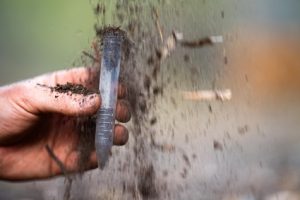Scientists in IA target ‘low-hanging fruit’ to sequester carbon
June 3rd, 2024 by Ric Hanson
(Iowa News Service) – Scientists in Iowa and their partners are going after what they call the ‘low-hanging’ fruit in their effort to sequester carbon and combat climate change. They’re making use of ingredients nature is already providing. It’s called biochar and its made by heating wood and other biomass at high temperatures with no oxygen. Biochar makes Iowa’s rich soil even more fertile, but it also turns that soil into one of the world’s most efficient carbon sinks, allowing it to absorb fossil fuel emissions, while creating healthier soil and sustainable fuels.
To Iowa State University soil science professor David Laird, mixing biochar into the soils is targeting the low-hanging fruit in carbon sequestration.
Last year, carbon sequestration projects removed more than 125-thousand tons of C-O-2 from the atmosphere, 92-percent of which were done using biochar, according to a group called C-D-R which tracks carbon sequestration.

Taking a soil sample for a soil test in a field. Testing carbon sequestration and plant health in Australia.
Once biochar is mixed with the soil, it can improve conditions for root growth and microbial activity in crops, which in turn reduce the planet’s greenhouse gas emissions. Biochar also helps the soil retain water, absorb nutrients and greenhouse gasses. While biochar won’t end climate change on its own, Laird argues it is an important piece of the puzzle given that the liquid transportation fuels the world relies on are notoriously hard to decarbonize.
While using biochar alone won’t help the planet reach a zero carbon emissions goal by 2050, Laird says it is a good first step that not only sequesters carbon but also a move toward creating fuels using biochar that could one day replace the heavy, emission producing liquid fuels.





